
You are reading:

You are reading:
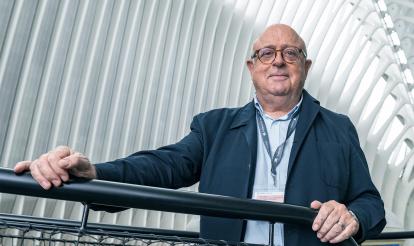
28.02.24
9 minutes readSend your questions to:
Scientific director of the Comprehensive Care for People with Advanced Diseases Programme at
the ”la Caixa” Foundation
Death makes us uncomfortable, even though it’s part of life: it’s something we will all experience. In this interview, Xavier Gómez-Batiste, scientific director of the ”la Caixa” Foundation’s Comprehensive Care Programme for People with Advanced Diseases, discusses the importance of breaking taboos in order to live in peace at the end of our lives, identifies the pillars of care for people with advanced illnesses and explains why society as a whole should be involved in the process.
In our society, there’s a big taboo around death. Is it important to break it in order to better face the final process of life?
Death creates uncertainty because we cannot know exactly when we’ll die and how it will happen. Many questions arise that are taboo in our society, but it’s very necessary to ask them. It’s crucial to be clear that dying is something that happens frequently. It’s so common that it’s worth preparing ourselves for it.
And how can we do this? What do we need?
We’ve seen that there are several factors that can help us. One is beliefs, whatever they are, they don’t have to be religious. It’s the values we believe in that give meaning to our lives and help us in times of vulnerability. People with strong spiritual beliefs cope better at the end of life.
Nuclear relationships also contribute: we can nurture them, take care of them. I strongly recommend investing in these relationships. There’s nothing worse than unwanted solitude at such a special time as the end of life.
Then there’s the legacy, what a person leaves behind because they’ve worked for it. It can be a family legacy (children, grandchildren, etc.) or a professional legacy (what they’ve contributed to society, their heritage, their work and so on). Either way, the legacy gives us strength in these moments. Sometimes within the legacy there are unresolved issues (relational problems, for example) that it’s good not to wait until the end of life to resolve, to facilitate the path of forgiveness, of peace with others.
The fourth element has to do with autonomy and decision-making: having control over the goals of care, who can best provide it, where and how we want to be cared for, etc. We shouldn’t wait until we’re ill, but rather start exercising autonomy and discussing it with our family or with our nurse or doctor of reference.
There are other elements that are not as important, but which add up. People with a positive psychology, for instance, adapt more easily. They have a sense of humour that helps them cope with difficult situations. In addition, I always like to talk about hope: if we have an advanced chronic illness and a limited life expectancy, our hope is not that we’ll live many years, but that we’ll have the love and support of the people who care about us, that we’ll be well looked after, and so on. Hope can always be reformulated.
It’s essential to work on all these factors as a society, not just as individuals.
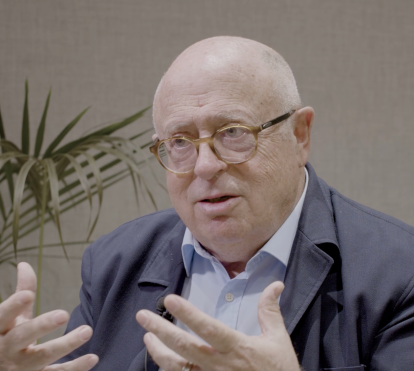
Pain at the end of life is a major concern, but what remains to be done?
A lot of progress has been made in the area of pain, although there are still aspects of symptom control that can be improved. It’s estimated that about 80% of people with advanced frailty are in residential care homes, in the community, and that the pain management of about 50% of them could be improved. But some time ago we also realised that everything related to the psychosocial and spiritual needs of people at the end of their lives (the meaning of life, the more psychological aspects of adapting to the disease, the social aspects of caring for families, etc.) was underdeveloped and leading to suffering. This has led to the creation of programmes such as that of the ”la Caixa” Foundation, which focuses on responding to this type of need through 65 multidisciplinary psychosocial care teams (EAPS) in Spain and 11 in Portugal, which complement the palliative services of the public health system.
We associate the Word palliative with the end of life and suffering. How can we lose our fear of it?
Palliative care originated in England in the 1960s and was dedicated to the care of people with advanced terminal cancer who had a prognosis of weeks. It was an absolutely excellent model of care, and innovative in proposing comprehensive pain management (not only physical, but also emotional, social, spiritual and ethical pain, and so on). But it’s important to understand that palliative care has evolved in the last 40 or 50 years.
Firstly, we now know that what we’ve learned from caring for these patients can be applied to people with other conditions (dementia, heart or organ failure, frailty, etc.). And the Foundation’s team is one of the leaders in our field that has worked on chronic care for all types of advanced illness.
The second transition has to do with early intervention: everything that’s been learned is also useful in attending to people who have advanced disease, but will live for months or even years. It’s not so much about caring for someone who’s at the end of their life as it is about caring for someone who’s suffering, regardless of their prognosis. Suffering can also occur in people who are going to be cured. Someone waiting for a bone marrow transplant may need palliative care, even if they’re going to get better.
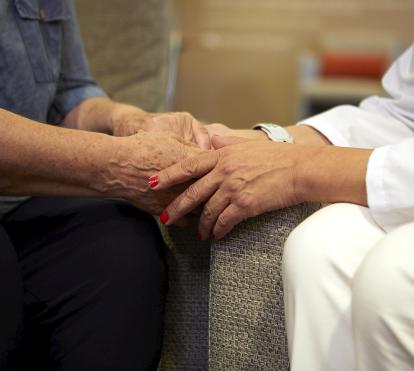
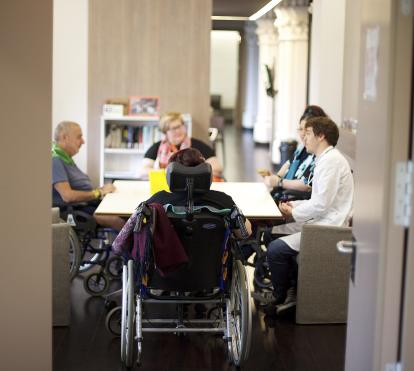
Spain has 0.8 palliative care teams per 100,000 inhabitants. Is that enough?
Spain is in a relatively intermediate situation in implementing the development of this type of care, and there are great differences between the different autonomous communities, but we can say that there are several areas with needs that are not fully covered. For example, we know that in about 50% of hospitals the implementation of palliative care services is lacking. So there’s room for improvement, because we know that in acute care hospitals, about 40% of people have palliative care needs.
Another area that requires attention is that of residential nursing homes. In Spain, there are around 360,000 residential care beds in which the need for palliative care is between 50% and 70%, but such care in these facilities is relatively underdeveloped, although we have excellent references of homes that have implemented it well.
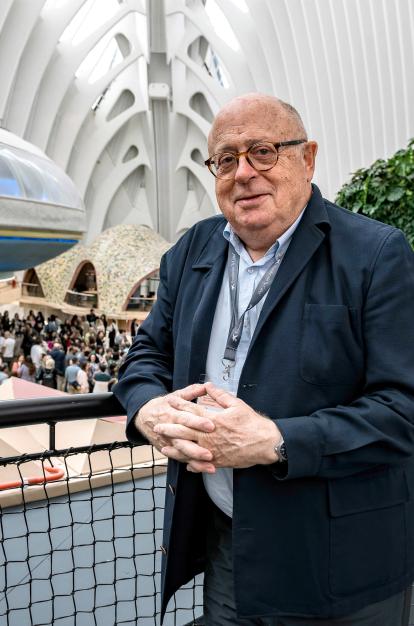
Finally, special attention must be paid to the care of the most vulnerable people: those who, in addition to an advanced illness and a limited life expectancy, have a psychosocial vulnerability (for example, a woman in a situation of unwanted solitude who shows signs of dementia and has few financial resources).
One way to solve this would be to better identify these unmet needs and to develop a national palliative care plan that addresses the issue in a comprehensive manner, involving the whole of society. In the Foundation’s programme, we’re working to make palliative care a universal right, since it’s a good social and health indicator of respect for people’s dignity.
COVID brought to light extremely difficult end-of-life situations for individuals as well as their families. Have we learned from it?
Covid was a tsunami of need that had a devastating impact on the entire system. Initially, we focused on preventing infection, somewhat neglecting care. Then we saw that there were huge unmet needs at the end of life: people dying alone, for example. Now we have to take a step back and learn from the teams and organisations that responded well thanks to committed, compassionate, competent teams. Society must prepare itself to provide a humane and caring response to similar emergencies in the future. Because compassion is an individual attitude, but can be organised. In fact, our programme, which has served more than 650,000 people since its inception, is a good example of how psychosocial and spiritual care with compassion at its core can be organised and is effective and efficient.
What advice would you give to a person who has just become a long-term carer due to the illness of a family member?
The first thing is that it’s necessary for them to have a committed attitude towards the person they’re caring for. Secondly, I would tell them that they need tools: training (to know how to care for someone with mobility difficulties, for example), but also emotional tools (not only to respond to the emotional needs of the person they’re caring for, but also to know how to care for themselves). Logistical issues also need to be organised: who will provide the care, how, and so on. And then there’s the question of grief prevention: this is not something to think about when the person dies, but to plan in advance in order to avoid more complex grief situations. For all these reasons, the ”la Caixa” Foundation created the Carers’ School, which has already trained thousands of volunteers and family members.
You often place special emphasis on the compassion, kindness and humanity of healthcare professionals. Why is that?
The best thing is to be a good person everywhere, but in the field of health and social care, and especially in palliative care, what brings excellence is compassion, empathy, presence, honesty and transparency.
In addition to professionals working in palliative care, many more people can help the sick person and their families. What is community care?
It consists of involving society as a whole in the development of palliative care, which is not just a health issue, but a shared commitment that makes the community a caring community. It depends on individual factors, but can be promoted by engaging people in this reflection on how we can best adapt to the end of life and giving them tools and support, as well as by promoting that compassionate attitude we’ve been talking about to facilitate identification of the most vulnerable people and be able to give them additional help. It’s not something that can be improvised, we have to invest in this different social behaviour. We need to intervene in unwanted solitude and encourage volunteering and other forms of social participation. Only in this way will we all be able to live in peace at the end of life.